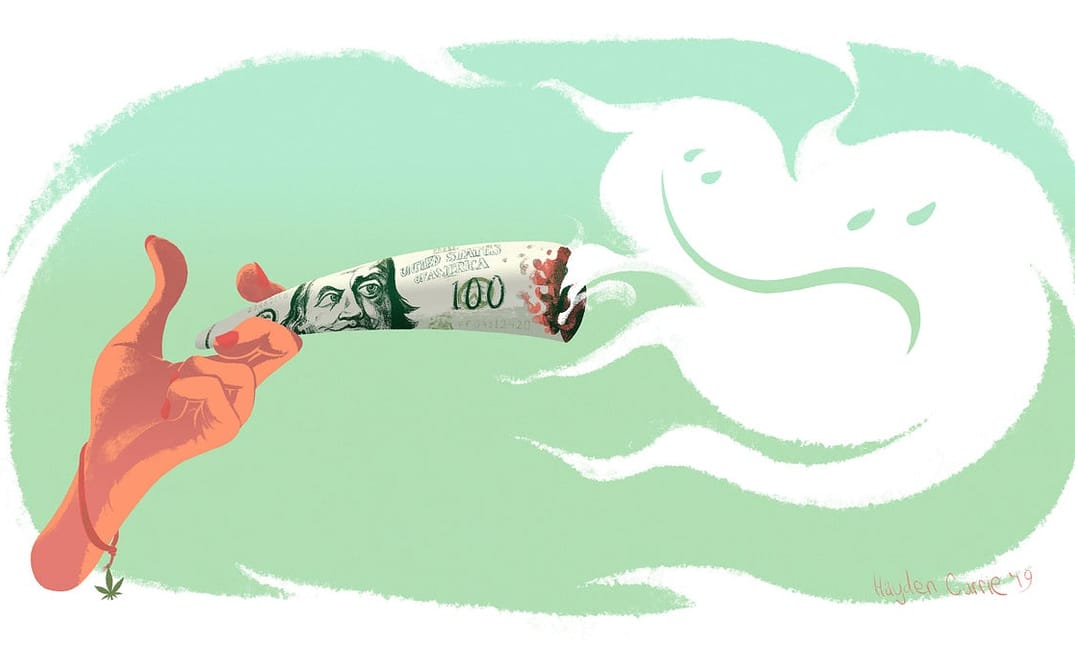
Three years after recreational marijuana became legal in California, the profits for the state of California have seemingly gone up in smoke. Legal cannabis dispensaries in Oakland are doing their best to recover from operational losses due to the invasive taxes placed upon them.
To rehash, on November 9, 2016, California voters passed the Control, Regulate and Tax Adult Use of Marijuana Act, which received 57% voter approval. Proposition 64 allows adults ages 21 and older to possess and use marijuana for recreational purposes. The measure also came with two new taxes levied on cultivation and retail price. While the new measure made cannabis legal for adults to purchase and consume, it also created issues for cannabis consumers.
The tax rate stems from Measure V, which was passed in 2010 and establishes a 10% tax for adult use and a 5% tax for medical use. If Oakland dispensaries are forced to operate at these high tax rates, residents may not have access to clean cannabis in the future. In addition, Oakland’s cannabis equity program, which helps give people of color an opportunity in the industry, may not be able to survive if potential customers choose the underground market.
“It’s making it extremely difficult for legal shops in the area. There are cities that have lower taxes than Oakland, but we are at 10% here,” said Kevin Ahaesy, CEO of dispensary ECO Cannabis. “I think most shops in the area are losing money and hanging on by a thread at this point, hoping for a change.”
“In 2018, we lost 20% of our total yearly revenue to the underground market. This year, we are getting back to normal. The cost of cannabis has dropped, and the quality has improved significantly since 2017.”
The main issue is that legally regulated shops across California have been losing profits due to consumers being turned off by high state, sales, and excise taxes.
I used to shun the high taxes. When I first started consuming cannabis in 2016, I paid $60 at a medical-office building near my house for a medical-marijuana card, thinking I had acquired a golden ticket to clean cannabis. My assumption was that I wouldn’t have to worry about the purity of the products if I purchased them at a dispensary. But it was difficult to figure out which shops were safe in my hometown of Cypress. I used to go on Weedmaps to find dispensaries that I thought were legally regulated. A full-time working student on a budget, I visited different shops and purchased products at the lowest prices.
I was enjoying what I believed to be clean cannabis products for close to a year until an incident occurred that almost made me quit using cannabis altogether. I had an episode involving hives, shortness of breath, and major migraines after smoking one night. I suspected that myclobutanil, a pesticide otherwise known as Eagle 20 that was banned in legal cultivation, was to blame. I figured out that none of the dispensaries I had visited were actually legal after the places were raided by local authorities and shut down. After that, I chose to pay the high taxes that come with access to regulated cannabis because I never want to experience that again. But many people I know continue to support an unregulated market because it’s more affordable.
California generated only $345 million in taxes for 2018 versus the $643 million in excise and cultivation taxes projected by former governor Jerry Brown. State officials continually put the blame on exorbitant cultivation taxes, such as $9.25 per ounce of marijuana flowers and $2.75 per ounce of leaves, that have been placed on the legal-pot industry.
With a prior state sales tax close to 15%, the underground market was forcing dispensaries out of business quicker than a burning joint. Why would people purchase legal, taxed cannabis when they could obtain marijuana without paying any taxes?
In response to the inflated tax rate, the Oakland City Council voted unanimously this year to lower the gross receipt tax on cannabis businesses from 10% to 0.12 % for every $1,000 collected.
Debby Goldsberry, CEO of Magnolia Wellness and co-founder of Americans for Safe Access (ASA) and the Medical Cannabis Safety Council (MCSC), told me that the City of Oakland calculated the cannabis taxes at 10% in the original budget, promising raises to unionized city workers that never came. “I’m not sure the bill that passed in May helped any of us at all,” Goldsberry told me. “In 2018, we lost 20% of our total yearly revenue to the underground market. This year, we are getting back to normal. The cost of cannabis has dropped, and the quality has improved significantly since 2017.”
Since the nonmedical-cannabis business rate went into effect in January of 2018, nearly all dispensaries—small and large—have been operating at a loss. Even with this change, local cannabis-business owners say it’s still not enough. Numerous dispensary owners and employers testified in May to the Oakland City Council that it’s already difficult enough to operate and start up a business in the current state of the industry.
Underground-market cannabis is much easier to maintain and sell because illegal farmers don’t have to throw out their crops when powdery mildew outbreaks, mites, and mold can be contained by spraying pesticides without worrying about legal regulations.
In comparison to neighboring cities, Oakland’s tax rate due to Measure V is double that of Berkeley (5%), with Emeryville at 3%, San Francisco at 5%, and Santa Rosa at 3%.
“We can’t get traditional banking methods to handle our money,” said Kevin Ahaesy of ECO Cannabis. “It’s hard, because you can operate at a loss for six months to two years, and you depend on the bank to help you, but that’s not the case here.” Ahaesy points out that security is also expensive and that security companies take advantage of dispensaries by overcharging them. “We have been broken into over three times,” Ahaesy continues. “I’ve had to start my own security company to protect my business.”
Since the federal government still classifies marijuana as a Schedule 1 drug, pot businesses are unable to legally dispense their earnings into the banking system. This forces legal marijuana businesses to be stuck working with cash—which feeds into the underground-market problem.
Legal weed doesn’t mean pesticide-free weed either. Another issue causing the cannabis-tax-revenue hiccup derives from the same reason why people try to avoid street pharmaceuticals: the products are tainted. When growing cannabis on a large scale became a free-for-all, ethics took a back seat for some growers and suppliers. Underground-market cannabis is much easier to maintain and sell because illegal farmers don’t have to throw out their crops when powdery mildew outbreaks, mites, and mold can be contained by spraying pesticides without worrying about legal regulations.
“I’d say the huge difference between the underground market and the legal market is not knowing the logistics of what’s in it, where it’s from, or what the potency is. Going to the taxed shops is easier on my conscious since I know what’s in it and where it’s from,” said Mitchell Morris, a medical-marijuana patient. “And if being taxed for well-regulated marijuana makes it legal in California, then so be it.”
In 2016, Steep Hill, a Berkeley-based testing facility, detected pesticides in 84.3% of random samples obtained from unregulated shops in the area. “We are in recovery mode,” said Goldsberry of Magnolia Wellness. “More people are starting to be more conscious about what they are buying. One thing I like about Proposition 64 is that I get to know my suppliers. I know the products are safe and are coming from good people.”
Illegal growers faced with state pesticide-testing regulations can make their money elsewhere by expediting dirty products for nearly triple the price to the 17 states that haven’t legalized recreational or medical marijuana. But that only drives away profit from the states that are doing it right.
In July, the Oakland City Council was considering a package of tax reductions proposed by council member Dan Kalb. It would eliminate distinctions between medical and non-medical business taxes and create a tiered and category-based structure for taxation over the next couple of years. In the meantime, the City of Oakland will continue to give out permits for the legal operation of dispensaries, but many business owners will be left empty-handed to figure out the rest.







